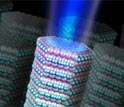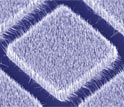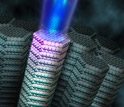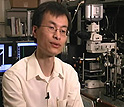News Release 07-053
Berkeley Nanotechnology Pioneer to Receive $500,000 Waterman Award
Annual prize from NSF recognizes outstanding young individual who is revolutionizing research
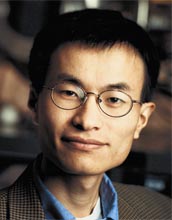
Chemist Peidong Yang is the 2007 winner of the National Science Foundation's Alan T. Waterman Award.
May 15, 2007
B-roll is available upon request. Contact Josh Chamot (jchamot@nsf.gov), Media Officer for Engineering, for additional details.
This material is available primarily for archival purposes. Telephone numbers or other contact information may be out of date; please see current contact information at media contacts.
The National Science Foundation (NSF) has chosen Peidong Yang, a chemist at the University of California, Berkeley, to receive the 2007 Alan T. Waterman Award. A nanotechnology expert, Yang has pioneered research on nanowires, strings of atoms that show promise for a range of high-technology devices, from tiny lasers and computer circuits to inexpensive solar panels and biological sensors.
The annual Waterman award recognizes an outstanding young researcher in any field of science or engineering supported by NSF. Candidates may not be more than 35 years old, or 7 years beyond receiving a doctorate and must stand out for their individual achievements. In addition to a medal, the awardee receives a grant of $500,000 over a 3-year period for scientific research or advanced study in their field.
"Not only did Yang develop powerful methods to synthesize 1-dimensional semiconductor nanostructures, he continues to demonstrate such creative energy when exploring fundamental physical and chemical principles, such as the basic science needed to transform developments in fields ranging from sensors and molecular computers to biotechnology," said David Nelson, director of NSF's Solid-State Chemistry Program and one of the officers who has supported Yang's research.
In a relatively short time, Yang has created one of the nation's leading laboratories for the study of nanowires. Like nanotubes, nanowires are filaments only molecules wide with nearly miraculous properties, yet nanowires lack a hollow core and are proving generally easier to create and manipulate. Yang's research team has developed novel, efficient ways to create particularly sophisticated nanowires and complex nanowire arrays.
"As we were dealing with a new class of nanostructure, naturally there were many fundamental questions and challenges that needed to be addressed," said Yang. "For example, how could we make them in a controlled manner? Do they have interesting chemical and physical properties? We are lucky that we are among the first few groups who started to address and answer some of these interesting questions."
By controlling the self-assembly of the wires and their orientation, Yang and his colleagues have created devices such as a wire only a hundred nanometers (billionths of a meter) wide that fires ultraviolet laser light; a patchwork of oriented nanowires that shows promise for shrinking the next generation of computer chips; and a nanowire array that has properties akin to solar panels but could potentially cost far less and is manufactured using an environmentally friendly process.
"Nanowires represent a rich family of functional materials," said Yang. "It is now possible to design and synthesize nanowires with quite complex structures based on progress made in the past couple of years. This type of control in nanostructural engineering has generated a rich collection of fascinating properties and functionalities, including nanoscale lasers, nanowire-based transistors, sensors and solar cells. These nanowire materials will have a particularly significant impact in areas such as energy conversion and solid state lighting."
Peidong Yang was born and raised in the Chinese city of Suzhou, leaving to study chemistry at the University of science and Technology of China in Hefei in 1988. Earning his Ph.D. degeree from Harvard in 1997, Yang then traveled to UC, Santa Barbara in 1997, and arrived at UC-Berkeley in 1999. In a short time, Yang has established himself as a rising star, publishing widely and receiving such awards as the NSF CAREER Award, the Alfred P. Sloan research fellowship, the Arnold and Mabel Beckman Young Investigator Award, the MRS Young Investigator Award, the Julius Springer Prize for Applied Physics, and the American Chemical Society's Pure Chemistry Award.
Following the award ceremony at the U.S. State Department on May 14th, NSF will host Yang and a distinguished panel on May 15th in a teleconference for journalists on emerging nanotechnologies. The program will highlight laboratory developments poised to become marketable products in the future. Information is available in the On the Nano Horizon: Emerging Technologies media advisory.
In addition to his Waterman award, Yang has received support from NSF through grants 0352750 and 0092086, as head graduate advisor for the Graduate Group in Nanoscale Science and Engineering through NSF IGERT grant 0333455 and as co-principal investigator for the NSF Center of Integrated Nanomechanical Systems, a Nanoscale Science and Engineering Center.
-NSF-
-
View Video
One of Peidong Yang's achievements was the development of a nanowire laser.
Credit and Larger Version -
Yang and his colleagues have grown arrays of zinc oxide and gallium nitride nanowires.
Credit and Larger Version -
One of Peidong Yang's achievements was the development of a nanowire laser.
Credit and Larger Version -
View Video
Interview with Peidong Yang about the research that lead to the Waterman Award.
Credit and Larger Version
Peidong Yang
Department of Chemistry
Department of Materials Science and Engineering
University of California, Berkeley
(510) 643-1545
www.cchem.berkeley.edu/~pdygrp/main.html
Peidong Yang received a B.S. in chemistry from the University of Science and Technology of China in 1993 and a Ph.D. in chemistry from Harvard University in 1997. Following postdoctoral research at the University of California, Santa Barbara, Yang joined the faculty in the department of Chemistry at the University of California, Berkeley in 1999. Currently associate professor in the Department of Chemistry, Materials Science and Engineering, he is also the deputy director for the Center of Integrated Nanomechanical Systems. Yang also serves as an associate editor for the Journal of the American Chemical Society (ACS). In addition to the 2007 NSF Waterman Award, Yang has received the NSF CAREER Award, the Alfred P. Sloan research fellowship, the Arnold and Mabel Beckman Young Investigator Award, the MRS Young Investigator Award, the Julius Springer Prize for Applied Physics, and the ACS Pure Chemistry Award. Yang's main research interests focus on one-dimensional semiconductor nanostructures and their applications in nanophotonics, nanoelectronics, energy conversion and nanofluidics.
Media Contacts
Joshua A. Chamot, NSF, (703) 292-7730, email: jchamot@nsf.gov
Robert Sanders, University of California, Berkeley, (510) 643-6998, email: rsanders@berkeley.edu
Program Contacts
Jimmy Hsia, NSF, (703) 292-7020, email: jhsia@nsf.gov
David L. Nelson, NSF, (703) 292-4932, email: dnelson@nsf.gov
Mayra N. Montrose, NSF, (703) 292-4757, email: mmontros@nsf.gov
Principal Investigators
Peidong Yang, University of California, Berkeley, (510) 643-1545, email: p_yang@uclink.berkeley.edu
Related Websites
Fact Sheet: Alan T. Waterman Award: http://www.nsf.gov/news/news_summ.jsp?cntn_id=102999
The U.S. National Science Foundation propels the nation forward by advancing fundamental research in all fields of science and engineering. NSF supports research and people by providing facilities, instruments and funding to support their ingenuity and sustain the U.S. as a global leader in research and innovation. With a fiscal year 2023 budget of $9.5 billion, NSF funds reach all 50 states through grants to nearly 2,000 colleges, universities and institutions. Each year, NSF receives more than 40,000 competitive proposals and makes about 11,000 new awards. Those awards include support for cooperative research with industry, Arctic and Antarctic research and operations, and U.S. participation in international scientific efforts.
Connect with us online
NSF website: nsf.gov
NSF News: nsf.gov/news
For News Media: nsf.gov/news/newsroom
Statistics: nsf.gov/statistics/
Awards database: nsf.gov/awardsearch/
Follow us on social
Twitter: twitter.com/NSF
Facebook: facebook.com/US.NSF
Instagram: instagram.com/nsfgov

